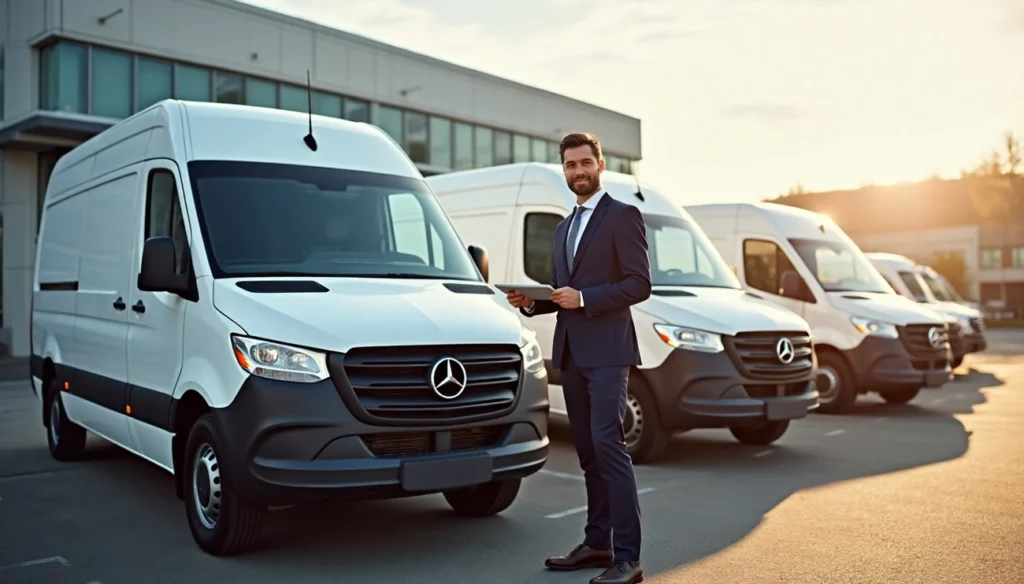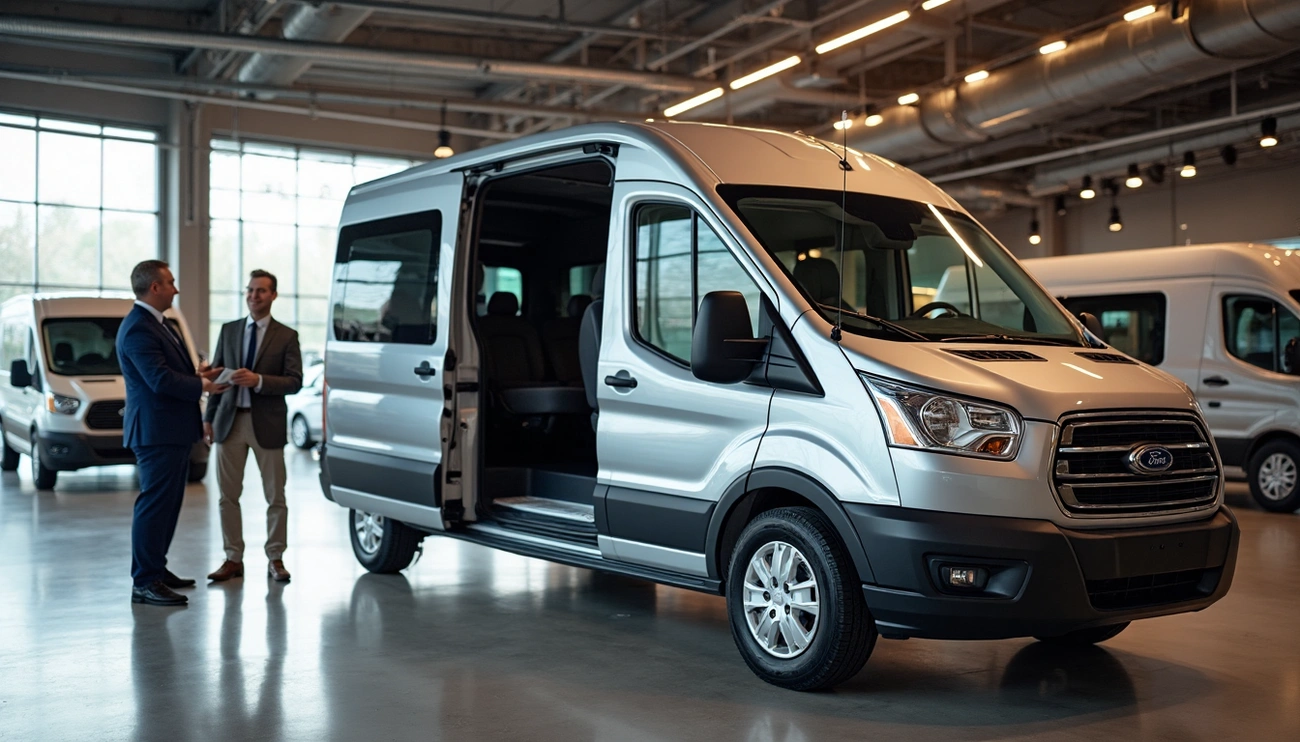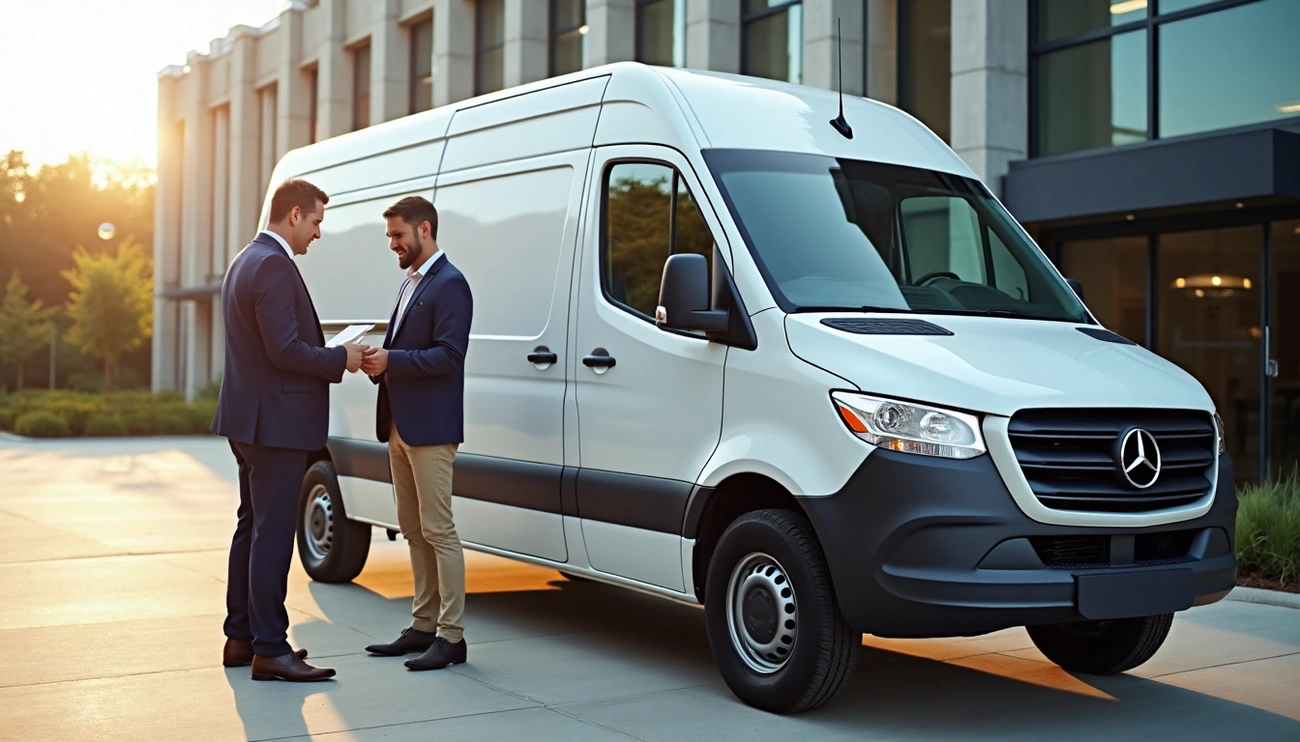Business Van Finance Strategies
Business van finance isn’t a one-size-fits-all game—you need the right fit for your company’s unique needs. Whether you’re running deliveries, construction jobs, or electrical services, a reliable van becomes the backbone of your operations. Source
Here’s what’s on offer: Hire Purchase deals span 12 to 60 months with deposits starting around 10%. Finance Lease and Contract Hire give you access to vehicles without the ownership headaches. Best part? These options put you behind the wheel of newer, more efficient vans that keep your business moving forward. See self employed van finance

The benefits go way beyond just getting from A to B. Smart van financing keeps your cash flow healthy while you build your fleet. You might even snag tax relief on your commercial vehicle, plus leasing lets you upgrade more often. With deals ranging from £6,000 to £10 million over one to six years, there’s something for every business size. See business van lease
Ready to explore your options? We’ll walk you through the different business van finance routes, help you pick the right one for your fleet, and break down the eligibility requirements plus application steps. Plus, we’ll cover the real benefits for growing your business and the common mistakes to dodge along the way. See van finance for new business
Your Business Van Finance Options Explained
Vans are essential for most businesses, but they come with a hefty price tag. Good news? You don’t have to pay everything upfront. Several finance routes help spread the cost while keeping your cash flow healthy. See van finance lease
Hire Purchase (HP) Business Van Finance
Hire Purchase keeps things simple. Pay a deposit—sometimes just one monthly payment—then make fixed monthly payments over 12 to 60 months. Once you’ve made all payments plus the option-to-purchase fee, the van is yours completely.
HP works best for businesses that:
- Clock up high mileage
- Plan to keep vans long-term
- Want zero mileage restrictions
- Like building equity while spreading costs over 1-5 years
HP deals are available for both personal and business customers, though some hire and reward purposes might not qualify. See van finance companies
Contract Hire (CH)
Contract Hire lets you lease brand-new vans without owning them. Usually no deposit required, with agreements running 24 to 60 months. Road tax renewal happens automatically at no extra cost, and you simply hand back the keys when you’re done. See used van finance
CH delivers these benefits:
- Monthly payments lower than Hire Purchase
- No depreciation worries or disposal hassles
- Maintenance packages often available
- Fixed monthly costs make budgeting easier
Watch out though—exceed your agreed mileage limits and you’ll face penalty charges. Plus, you’ll need to return the van in reasonable condition for its age and mileage. See electric van finance
Finance Lease (FL)
Finance Lease funds up to 100% of your van’s price over 12 to 60 months without ownership. When the primary lease ends, you can extend the lease, sell the van, or move to a secondary rental period with minimal annual payments.
VAT-registered businesses love FL because you can reclaim up to 100% of the VAT on rentals. Choose between two FL structures:
- Full Pay-out: Cost split evenly across the term
- Balloon: Lower monthly payments with larger final payment
The sweet spot? You get to benefit from the van’s sale value at the end, with any surplus funds split between you and the finance company.
Personal Contract Purchase (PCP)
Van PCP mixes the best of Hire Purchase and Contract Hire. Make an initial deposit, then fixed monthly payments over 24-48 months. At the end, you have three choices: return the van, pay the pre-agreed “balloon payment” to own it, or use its value toward your next vehicle.
PCP’s monthly payments stay lower than HP thanks to that deferred balloon payment. Perfect for businesses that:
- Want flexibility when the agreement ends
- Prefer lower monthly payments
- Need to change vehicles regularly
- Drive moderate mileage
The right choice depends on your business needs, cash flow situation, and whether owning or using matters most to you.
Finding Your Perfect Finance Match
Picking the right finance for your van fleet goes beyond just comparing monthly payments—it’s about finding what actually works for your business. Smart decisions happen when you look at the full picture of how financing will affect your daily operations and long-term goals.
Know Your Cash Flow Reality
Start with an honest look at your company’s finances before you sign anything. Figure out what you can realistically handle for deposits and monthly payments without squeezing your operations. Short on upfront cash? Finance Lease or Contract Hire might be your best friends—they often need minimal deposits or sometimes none at all.
Don’t get caught by headline rates alone. Work out the real cost over the entire agreement, including all the interest, fees, and any charges that might pop up at the end. This bigger picture approach helps you pick something that fits your long-term financial strategy, not just what looks good right now.
Ownership or Just Access?
Here’s a key question: do you actually need to own these vans, or do you just need to use them? If having assets on your books matters for your business strategy, then Hire Purchase or Personal Contract Purchase makes more sense. But if you just want reliable vehicles without the ownership hassles, Contract Hire or Finance Lease gives you more wiggle room.
Think about these factors:
- How long you plan to keep each vehicle
- Whether building equity in business assets matters to you
- If you need regular upgrades to stay current
- How this affects your balance sheet
Mileage Patterns Matter Business Van Finance
Your expected mileage can make or break certain finance deals. Running high-mileage routes? Hire Purchase usually doesn’t restrict your miles, making it perfect for heavy users. Contract Hire and Personal Contract Purchase come with mileage caps—go over and you’ll face penalty charges that can really add up.
Most van lease deals include annual mileage allowances from 10,000 to 30,000 miles. When you’re calculating needs, factor in seasonal busy periods and potential business growth. Good news: total mileage is typically pooled across the whole contract period, giving you flexibility between years.
Tax Benefits and VAT Savings
The tax side of different finance options can dramatically change your real costs. For VAT-registered businesses, what you can reclaim depends on your finance type. Finance Lease and Contract Hire payments are usually tax-deductible business expenses, while Hire Purchase lets you claim capital allowances on the van’s depreciation.
Commercial vehicles often qualify for full VAT reclaim since they’re clearly business-only. Mixed personal and business use? You’ll need to split the tax claim and only reclaim the business portion.
Upgrade Cycles and Future Planning
Many businesses are stretching van replacement cycles from 3-5 years out to 7-8 years, finding the cost savings outweigh maintenance headaches. Going longer? You’ll need stronger service and maintenance management as vehicles age.
Electric vehicle transition adds another layer. Some companies are using electric SUVs temporarily until proper electric vans become available. This approach lets businesses meet environmental goals while waiting for better technology.
Your perfect finance solution balances cash flow needs, ownership preferences, mileage requirements, tax situation, and upgrade timing. Take time to evaluate these factors thoroughly—you’ll find the option that truly supports your fleet’s needs and future growth.
Getting Approved: Your Van Finance Application Guide
Getting your business van finance approved starts with knowing what lenders want and having your paperwork ready. Here’s your straightforward guide to the application process.
What limited companies need to qualify
Most lenders want to see your business has been trading for at least 13 months—proof you’re not just starting out. Annual turnover of £100,000+ is typically expected, though this varies between finance providers. Essentially, you need to show your company is stable and can handle regular payments.
New businesses with shorter trading histories can still get finance, but expect higher interest rates or personal guarantees from directors. Remember, the van must be for business use only, and both your company and the vehicle will get checked out.
Paperwork you’ll need
Get these documents ready before you apply:
- Proof of identity (driving license or passport)
- Proof of address (utility bills from the last 90 days)
- Bank statements (usually 3 months’ worth)
- For self-employed: latest tax return or SA302 form from HMRC
- Business registration documents
Lenders use these for basic fraud checks and affordability assessments. Most start with a “soft search” credit check that won’t hurt your credit score until you formally apply.
How your credit score matters
Your credit score directly affects both approval chances and interest rates. UK scores typically range from 300 to 850, with 650+ considered good. Excellent scores (750+) unlock the best rates and terms.
Poor credit doesn’t automatically rule you out. Specialist lenders work with businesses that have credit challenges, though you’ll pay higher rates for the extra risk.
Finance calculators: Your planning tool
Use business van finance calculators to estimate costs before applying. You’ll need:
- Loan amount (van price minus deposit)
- Term length
- Estimated interest rate
- Credit history assessment
The calculator gives you an estimated monthly payment. This helps you budget properly before committing to anything. Rates typically range from 18.5% to 47.5% APR depending on your creditworthiness.
Why Van Finance Works for Growing Fleets
Smart van financing delivers real advantages that go far beyond just getting vehicles. Here’s why businesses choose this route over buying outright.
Cash Flow That Actually Flows
Van finance keeps your working capital where it belongs—in your business. Spread costs over time instead of draining your bank account upfront. Fixed monthly payments make budgeting simple and predictable. This stability gives you the foundation to chase growth opportunities and invest in what matters most.
Modern Vans Within Reach
Get behind the wheel of newer, more efficient vehicles that might otherwise stretch your budget. These models deliver better fuel economy, smart navigation systems, and enhanced safety features that boost your operational efficiency. Less breakdowns mean fewer disruptions to your business. Many finance packages now include dedicated EV options to help you go greener.
Scale Up (or Down) Fast
Your fleet can grow with your business without the ownership headaches. Need more vans for a busy season? Done. Want to try different vehicle types? No problem. This flexibility proves invaluable for startups and SMEs hitting rapid growth phases—you can meet customer demand without stretching your resources thin.
Tax Benefits That Add Up
Business van finance offers solid tax advantages:
- Monthly lease payments typically count as business expenses
- VAT-registered companies can reclaim up to 100% of VAT on rentals
- Interest portions of loan payments are generally tax-deductible
These benefits reduce your overall tax bill while improving your cash position.
Professional Image, Happy Team
Quality company vehicles make a real difference to how customers see you and how your employees feel about their work. University of East Anglia research shows a direct link between employee satisfaction and financial performance—companies with happier employees achieved better profitability. Their study found firms with higher employee satisfaction ratings experienced almost one percent higher annual return on company assets.
Common Pitfalls and How to Dodge Them
Even with the perfect finance solution, businesses stumble into costly traps when building their van fleet. Spot these pitfalls early and you’ll save yourself serious headaches down the road.
Getting locked into long-term deals
Those extended agreements might look tempting with their lower monthly payments, but they can trap you fast. Picture this: your business pivots, technology changes, or your fleet needs shift—suddenly you’re stuck with the wrong vehicles for years. Before you sign anything, ask yourself: will your business needs stay the same throughout the entire contract? Think about how industry changes might affect your fleet requirements too.
Underestimating your mileage needs
This one hits hard and often. Most lease contracts cap you at 10,000-30,000 miles annually. Go over? You’ll face penalty charges that add up fast. Here’s the thing: your total mileage pools across the whole contract period, so you’ve got some wiggle room between years. If you’re running high-mileage operations, either negotiate higher limits upfront or stick with finance options that don’t restrict your miles.
Forgetting about maintenance costs
Monthly payments grab all the attention, but maintenance expenses blindside many businesses. Smart money says budget £500-£1,000 yearly for vehicle upkeep. Break that down: annual services (£150-£400), MOT costs (£58.60), new tires (£280-£400 per set), plus those surprise repairs (£200-£500). Want predictable costs? Look for finance packages that bundle maintenance in.
Rushing into the first deal you find Business Van Finance
Jumping at the first finance offer usually costs you. Take time to compare:
- Interest rates from different providers
- Contract flexibility for early exits
- Total ownership costs beyond monthly payments
- Hidden fees and end-of-contract charges
Sure, researching finance options takes time, but this legwork protects you from expensive deals that don’t fit your actual business needs.
Ready to Finance Your Fleet?
Business van finance gives you the flexibility to grow your fleet without draining your cash reserves. We’ve covered the main options—Hire Purchase for ownership, Contract Hire and Finance Lease for flexibility, and PCP for the best of both worlds.
Your choice comes down to what matters most: cash flow, ownership goals, mileage needs, tax benefits, and how often you want to upgrade. Take time to weigh these factors against your business plans.
The application process is straightforward once you know what’s needed. Even with less-than-perfect credit, options exist to get you on the road.
Smart van financing delivers real benefits: better cash flow management, access to newer vehicles, room to scale as you grow, tax advantages, and a professional image that impresses customers and keeps employees happy.
Just watch out for the common traps: long contracts that lock you in, underestimating mileage, forgetting maintenance costs, and not shopping around for the best deal.
The right finance strategy fits your business like a glove. Do your research, compare options, and pick the solution that supports your growth plans while keeping operations smooth.
Whether you need one van or twenty, there’s a finance option that works for your business. Ready to get your fleet moving?
FAQs
Q1. What are the main types of business van finance options available? The main types of business van finance options include Hire Purchase (HP), Contract Hire (CH), Finance Lease (FL), and Personal Contract Purchase (PCP). Each option has different terms, benefits, and implications for ownership and usage.
Q2. How does my credit score affect van finance approval? Your credit score plays a significant role in determining both approval likelihood and interest rates. While a higher score (typically 650+) increases chances of approval and better rates, some lenders offer options for businesses with less-than-perfect credit, albeit at higher interest rates.
Q3. What documents are typically required when applying for business van finance? Common documents required include proof of identity, proof of address, financial documentation such as bank statements, business registration documents, and for self-employed individuals, the latest tax return or SA302 form from HMRC.
Q4. How can van finance benefit my business’s cash flow? Van finance can improve cash flow by spreading the cost of vehicles over time, allowing you to maintain working capital for other investments. Fixed monthly payments create predictability, making it easier to manage finances and plan for growth opportunities.
Q5. What are some common pitfalls to avoid when financing a business van? Common pitfalls include overcommitting to long-term contracts, ignoring mileage limits and associated penalties, not budgeting for maintenance costs, and failing to compare different finance deals. It’s crucial to thoroughly assess your business needs and compare options before committing to an agreement.




